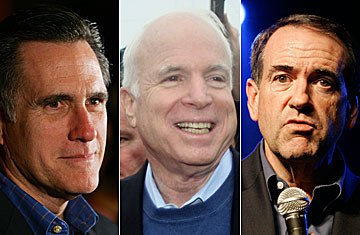
Mitt Romney, John McCain, Mike Huckabee
The South Carolina Republican primary has always been the Mother Superior of nominating contests, bringing order to the process, and rapping the knuckles of the rowdies, so that the rest of the calendar looks more like a coronation than a campaign. The state's location at the heart of the party's southern political base, as well as its mix of economic and religious conservatives, make it uniquely suited for the role. Not once since the inception of the primary in 1980 has its winner failed to go on to win the party's nomination.
For John McCain, who eight years ago was one of the rowdies put in his place by South Carolina, his victory Saturday night could not have been sweeter. It established him as what the party has lacked until now — a true frontrunner. "It took us a while, but what's eight years among friends?" McCain quipped in his victory speech.
But it is a fragile lead, as McCain himself acknowledged. "There are some tough contests ahead," he said. Former Arkansas Governor Mike Huckabee, with a strong second place showing, added of the race: "It is a process, and the process is far, far from over."
South Carolina did indeed play its traditional winnowing role, most notably by knocking Fred Thompson out of serious contention. The South Carolina result, however, will not be as determinative as it has been in the past. That's because the party itself is such a muddle, having come to South Carolina with three separate winners in the first three big contests. And the primary will soon be followed by an explosion of contests across the map. "The accelerated, front-loaded primary calendar was supposed to create order and instead has given us chaos," says Ralph Reed, the former head of the Christian Coalition, who helped orchestrate George W. Bush's victory over McCain here in 2000. "A party that abhors a vacuum is now staring into the abyss."
The contest more likely to play South Carolina's traditional turning-point role could be Florida's primary on January 29. It is an election in which the winner takes all of the 57 delegates at stake, and one in which-unlike contests in New Hampshire, Michigan and South Carolina-only Republicans will be allowed to vote. And for the first time, none of the four top GOP contenders can afford to skip the race.
Florida will also test their messages in a different way. It is the biggest, most diverse battleground they have encountered. The state also is feeling increasingly anxious about the economy, suffering from the subprime mortgage meltdown, an insurance crisis and a 49% surge in the number of unemployed in 2007.
In Florida, each of the candidates faces his own set of questions:
John McCain: Can he lock down Republicans? The common thread among his victories so far has been his strength with independents. And in South Carolina, independents once again pulled him over the finish line, though he is making inroads within his party. Exit polls indicated he tied Huckabee among voters who identified themselves as Republicans, with each of them winning 30%. (Among independents, however, McCain won 39-22%.) McCain may well need a sharper, more conservative message going forward, especially. One thing McCain has going for him: The more he wins, the more he looks like a winner-which is what he needs to bring in money for the mega-Tuesday round of primaries on February 5.
Mitt Romney: Can his retooled message, focusing on his Mr. Fix-it record and his business credentials, gain traction? The other candidates will be limping into Florida with little money; Romney's wealth gives him the capability to write himself a check for tens of millions. And having won the little-contested Nevada caucuses on the same day as the South Carolina primary, Romney comes to Florida with bragging rights for having won the most votes and the most delegates to date.
Rudy Giuliani: He took a big gamble, effectively skipping the early round of contests and staking everything on Florida. Will his 9/11 fame carry him through there? Giuliani has spent most of the past year leading in Florida, but has been sinking there in recent weeks, to the point where he now trails McCain in the latest polls.
Mike Huckabee: Can he expand his appeal beyond his religious conservative, evangelical base? Among those who identified themselves as evangelical or born-again Christian, Huckabee beat McCain 40-27% in South Carolina. But he only won 12% of those who did not put themselves in that category.
And as they make their way through the contests, all of the candidates increasingly will be called upon to answer another overarching question: Which of them, come November, has the best chance of beating whomever the Democrats will nominate?
